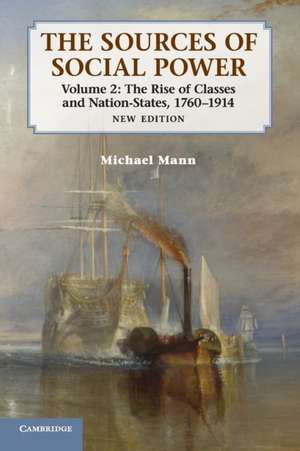The Sources of Social Power: Volume 2, The Rise of Classes and Nation-States, 1760–1914
Autor Michael Mannen Limba Engleză Paperback – 16 sep 2012
| Toate formatele și edițiile | Preț | Express |
|---|---|---|
| Paperback (1) | 285.68 lei 3-5 săpt. | |
| Cambridge University Press – 16 sep 2012 | 285.68 lei 3-5 săpt. | |
| Hardback (1) | 637.06 lei 6-8 săpt. | |
| Cambridge University Press – 23 sep 2012 | 637.06 lei 6-8 săpt. |
Preț: 285.68 lei
Nou
Puncte Express: 429
Preț estimativ în valută:
54.67€ • 59.37$ • 45.92£
54.67€ • 59.37$ • 45.92£
Carte disponibilă
Livrare economică 02-16 aprilie
Preluare comenzi: 021 569.72.76
Specificații
ISBN-13: 9781107670648
ISBN-10: 1107670640
Pagini: 844
Ilustrații: 5 b/w illus. 36 tables
Dimensiuni: 152 x 226 x 48 mm
Greutate: 1.09 kg
Ediția:Revised
Editura: Cambridge University Press
Colecția Cambridge University Press
Locul publicării:New York, United States
ISBN-10: 1107670640
Pagini: 844
Ilustrații: 5 b/w illus. 36 tables
Dimensiuni: 152 x 226 x 48 mm
Greutate: 1.09 kg
Ediția:Revised
Editura: Cambridge University Press
Colecția Cambridge University Press
Locul publicării:New York, United States
Cuprins
Preface to the second edition; 1. Introduction; 2. Economic and ideological power relations; 3. A theory of the modern state; 4. The Industrial Revolution and old regime liberalism in Britain, 1760–1880; 5. The American Revolution and the institutionalisation of confederal capitalist liberalism; 6. The French Revolution and the bourgeois nation; 7. Conclusion to chapters 4-6: the emergence of classes and nations; 8. Geopolitics and international capitalism; 9. Struggle over Germany, I: Prussia and authoritarian national capitalism; 10. Struggle over Germany, II: Austria and confederal representation; 11. The rise of the modern state, I: quantitative data; 12. The rise of the modern state, II: the autonomy of military power; 13. The rise of the modern state, III: bureaucratization; 14. The rise of the modern state, IV: the expansion of civilian scope; 15. The resistible rise of the British working class, 1815–80; 16. The middle class nation; 17. Class struggle in the second industrial revolution, 1880–1914, I: Great Britain; 18. Class struggle in the second industrial revolution, 1880–1914, II: comparative analysis of working class movements; 19. Class struggle in the second industrial revolution, 1880–1914, III: the peasantry; 20. Theoretical conclusion: classes, states, nations, and the sources of social power; 21. Empirical culmination - over the top: geopolitics, class struggle, and World War I; Appendix.
Recenzii
Reviews of the first edition: 'The ambition of the conception is, against all conventional expectations, matched by the clarity and grandeur of the execution.' The Times Literary Supplement
'This work offers a treasure trove of facts and interpretations that will be useful to readers in many disciplines …' Choice
'This is a book in the grand Weberian tradition. Mann's conceptual skills and historical grasp are virtuosic and the scope of his enterprise is truly impressive.' Politics and Society
'… a unique brand of historical sociology that is refreshingly iconoclastic, remarkably complex, and breathtakingly ambitious … a must-read for comparative and historical sociologists.' Contemporary Sociology
'This work offers a treasure trove of facts and interpretations that will be useful to readers in many disciplines …' Choice
'This is a book in the grand Weberian tradition. Mann's conceptual skills and historical grasp are virtuosic and the scope of his enterprise is truly impressive.' Politics and Society
'… a unique brand of historical sociology that is refreshingly iconoclastic, remarkably complex, and breathtakingly ambitious … a must-read for comparative and historical sociologists.' Contemporary Sociology
Notă biografică
Descriere
This second volume deals with power relations between the Industrial Revolution and the First World War.


